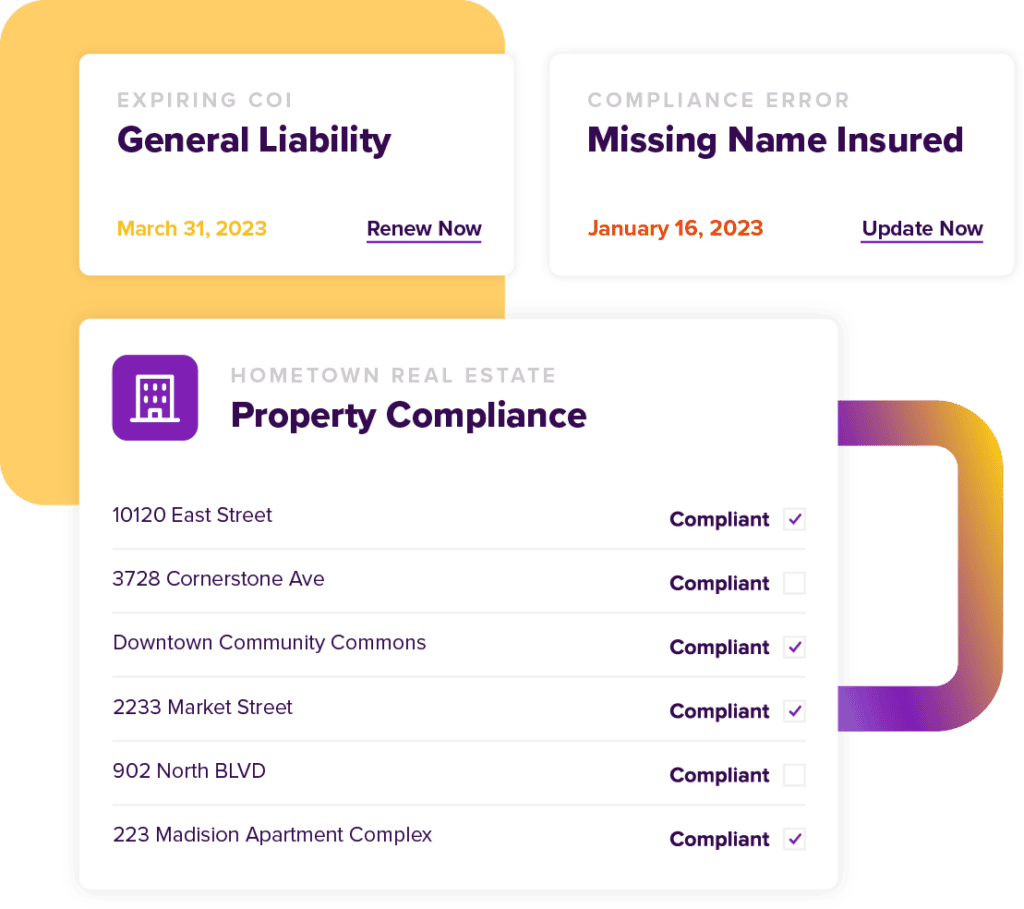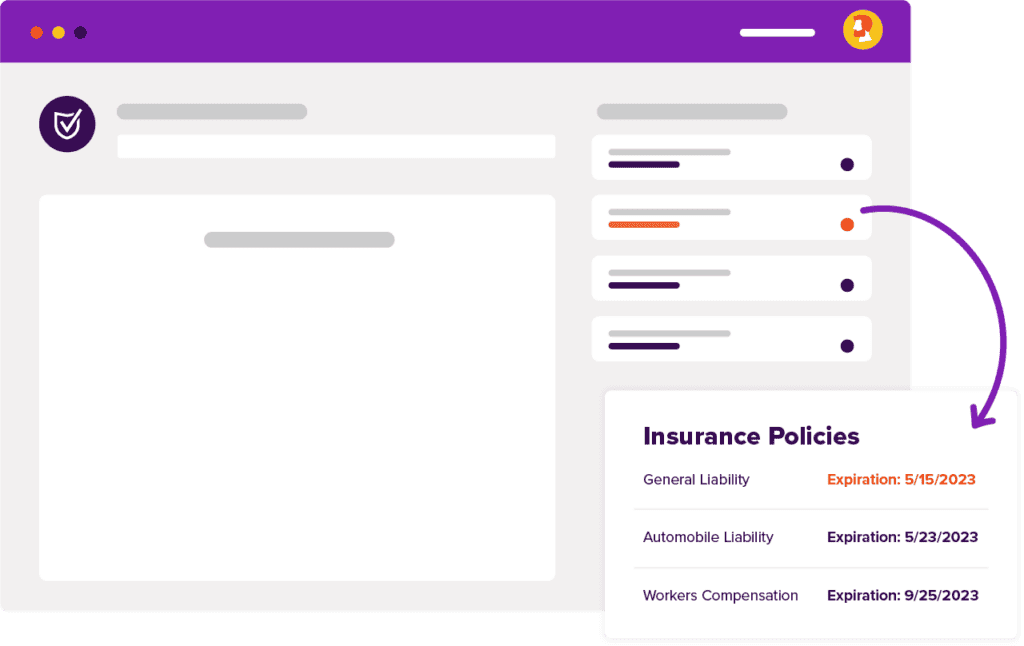Best Certificate of Insurance Tracking Software

Protect Your Business From Costly Claims
Ask your CFO or Risk Manager just how much claims and lawsuits can cost your business. If you are collecting certificates just to confirm they were received, you have no guarantee that your requirements are being met. myCOI Central is built on a foundation of insurance industry logic to ensure you remain protected with the appropriate coverage.
Automate Your COI Tracking
There’s no more need to worry about stacks of certificates cluttering up your office or hours of frustrating phone calls and emails to chase down certificates. myCOI Central provides your company with a solution to automate your insurance certificate requests, collection, and compliance resolution, while also giving your team a single, centralized repository to view compliance.


For Agents & Brokers
Win business and boost retention by providing agency branded, industry leading insurance tracking software to your insureds. Offer software only or add on your own compliance review services.
What Are The Benefits of COI Software?
View all CasesCertificate Of Insurance Compliance Tools
Any company—every company—that works with hundreds or thousands of third parties, be they contractors, vendors, or others, knows the amount of work that goes into a successful certificate of insurance tracking and verification program. Whether it’s by hand, with some form of spreadsheet, or by trying to force some kind of insurance policy tracking software to do the job, not every company selects the best certificate of insurance compliance tools.
And we understand. When you’re handed a stack and told “deal with these certificates now,” sometimes you don’t have time to make a long, careful choice. Sometimes the solution right now is what you need to use.
At myCOI we offer the industry-leading certificate of insurance tracking solution in both software, self-service form, and a fully-partnered, managed service offering. Our team of dedicated insurance professionals helps companies just like yours every day to confirm insurance compliance, verify coverage, and improve compliance ratings. Managing your insurance risk portfolio is one of the most important business functions. We’re here to erase your worry about that.
How To Track Certificates Of Insurance
Certificate tracking is the work a risk manager or compliance admin does to collect, verify and track certificates of insurance provided to that company by its third parties. Almost anyone a business hires to do work on its behalf can be asked to provide some form of proof of insurance. And on the face of it, that sounds like a pretty easy ask.
Collect a piece of paper? A standardized form? And store it? Easy!
Except each certificate of insurance has to be checked, first and foremost to ensure that it claims all the necessary coverages, amounts, limits, and exclusions that your company requires of its contractors. Sure, there is general liability insurance mentioned, but does it protect to the same amount that you require?
Also, what assurances do you have that the contractor didn’t let the policy lapse the day after they handed you the COI? Are you verifying with insurance agents that these contractors still hold the policies and protections that their COI claims? Are there exclusions to the contractor’s protection that will mean you’re held responsible for risk that should properly rest with the contractor?
We know you already know how to track certificates of insurance, but please remember that there are varied certificate of insurance requirements by state, and you need to be aware of them. Certificate of insurance tracking best practices in every case remind you to check your state requirements, and we’d be remiss if we didn’t do the same.
Certificate Of Insurance Tracking Software
The competition in the certificate of insurance tracking software space is fierce, and we’d be being dishonest if we didn’t say you need to choose the right solution for your company. Obviously, at myCOI we believe we are the right solution nine times out of ten, but we don’t fit every company, and that’s okay. Online certificate tracking could be a critical part of your business no matter what solution you use, whether that’s a full managed partner solution or a free COI tracking software.
You’ll need to define what “right” means for your business. Is it the least expensive? That depends on how you measure cost. In pure dollars, a free COI tracking software may work, but is it reliable? Do its developers offer support? Are there regular product updates coming out? If not, check it carefully to make sure it isn’t out of date.
Is “right” the least of your precious person-hours consumed by tracking certificates of insurance? Then a managed solution like myCOI offers may be best. Our team of insurance professionals know what they’re looking at, and they’re experts in making sure your certificates are promising what they say they do, that they meet your business requirements for coverage, and our quarterly verification makes sure the coverage stays in effect.
Regardless of what method you choose, knowing how to check certificate of insurance compliance should not be something you let fall off your radar.
Certificate Of Insurance Tracking Template Excel
If you’re looking for a simple and manual way to track the certificates of insurance in your business, then using a COI tracking spreadsheet is an option worth considering. Many companies begin with solutions like having their staff track insurance policies on Excel spreadsheets. And for smaller companies just starting out, that system works. For a basic certificate of insurance tracking template Excel is not a bad solution.
The drawback of using a certificate tracking spreadsheet is that it can be time-consuming to maintain and often require constant updating. What began as a simple project one person could track and easily snowball into a time-intensive process that’s impossible to scale as a company grows. Instead, companies might add more people and more spreadsheets, which leads to paperwork being lost or misplaced, which leads to increased chances for errors in the data.
That is exactly the worry that myCOI erases. Our systems are industry-leading. Our insurance professionals are top-notch. If you’re tracking hundreds of certificates of insurance, we’d love the chance to show you just how much time and effort we can save you.
Certificates Of Insurance Best Practices
Certainly the phrase “certificate of insurance best practices” is a loaded term. There are so many angles to come from that any list of best practices that aims to be complete is almost sure to miss the mark. We can make an attempt from our experience, but you need to be reminded at the outset that best practice can, and should be, modified to suit your company’s specific needs.
First, certificates of insurance should be created by insurance agents and brokers. The ease with which anyone can download fillable PDFs of certificates now means that the potential for COI fraud from third parties has never been higher, which makes keeping your verified compliance rating high is more critical than ever.
Certificate of insurance management, and knowing how to track certificates of insurance, are skills and tasks best suited to a risk management team, or sometimes a small group or person in the counsel’s legal department. There’s a lot involved in this kind of tracking, as we’ll cover below, and the distance between the work that needs to be done, and the amount of time and headcount often assigned to do it is what makes certificate tracking tools like myCOI so critical.
Certificates Of Insurance For Subcontractors
If you’re a subcontractor, or you hire subcontractors and have to track the certificates of insurance you receive from them, you may see a few oddities. Foremost among these oddities may be the sheer number of them you have to manage, because there can be a lot of subcontractors. Knowing how to organize certificates of insurance in this instance is going to be critical for managing your risk. This is true whether you’re a subcontractor, who may need lots of COIs to cover all the work you bid for, as well as if you’re a certificate holder, who employs the subcontractors.
If you’re asking which vendors need a certificate of insurance, the answer is pretty simple: any vendor that enters your business premises and takes any actions that may generate any risk at all needs to give you a certificate of insurance.
The next question, who needs to provide certificates of insurance, has a somewhat complicated answer. Certificates should be issued by the insurance agent or broker; no third party should be filling their own out. But it’s acceptable, even likely, that the third party will deliver the issued COI to the requesting party.
Knowing how to request a certificate of insurance from a vendor likely comes down to how your business works with vendors. In many cases, COIs with the required coverages are required as part of the vendor application process or were specified in the RFP, or in an agreement or contract. If not, it’s often a requirement before the vendor can begin working.
If you deal with a lot of vendors, you can often save a lot of time by having a sample letter requesting certificate of insurance from vendors on hand. Anything that saves you time in certificate of insurance compliance is a good thing.
Insurance Certificate Issuance Software
Insurance certificate issuance software is not something non-insurance companies typically have to worry about. The insurance company is responsible for issuing certificates of insurance to the company. If you’re an owner or manager, it’s crucial that you know what your responsibilities are and how those differ from someone in this role at another firm. Whether it comes down to handling employee-related matters or discussing business strategy with clients, a basic understanding of these roles will go a long way when forging relationships within your industry.
Sometimes people mention certificates of issuance, but that’s a different certificate. These testify to the issuance of certificates for things like bar codes or identification numbers. As it sounds, it’s a certificate of issuance meaning it certifies that something was issued.
Instead of wasting time asking what is certificate of issuance, focus on tracking your own certificates of insurance. With a COI tracking application, you’ll never need to worry about tedious paperwork again. You can also make sure that your records are always up-to-date thanks to automated updates from vendors.









